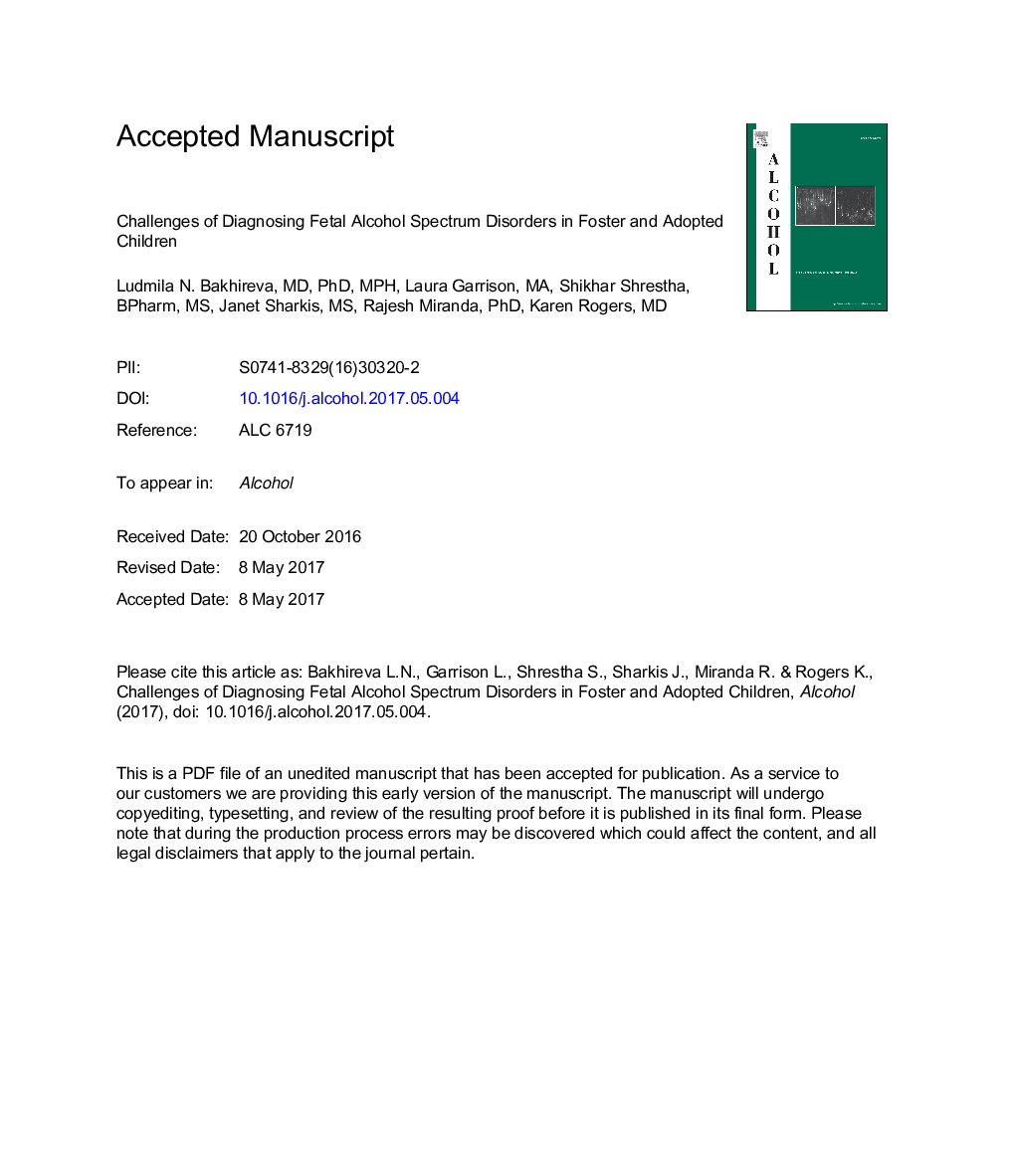| کد مقاله | کد نشریه | سال انتشار | مقاله انگلیسی | نسخه تمام متن |
|---|---|---|---|---|
| 7501488 | 1485962 | 2018 | 29 صفحه PDF | دانلود رایگان |
عنوان انگلیسی مقاله ISI
Challenges of diagnosing fetal alcohol spectrum disorders in foster and adopted children
ترجمه فارسی عنوان
چالش های تشخیص اختلالات طیف الکل جنین در کودکان پیش دبستانی و زایمان
دانلود مقاله + سفارش ترجمه
دانلود مقاله ISI انگلیسی
رایگان برای ایرانیان
کلمات کلیدی
اختلالات طیف الکل جنین، تشخیص، فرزندان فاستر، کودکان تصویب شده، قرار گرفتن در معرض الکل قبل از تولد،
موضوعات مرتبط
علوم زیستی و بیوفناوری
بیوشیمی، ژنتیک و زیست شناسی مولکولی
زیست شیمی
چکیده انگلیسی
Fetal Alcohol Spectrum Disorders (FASD) might be 10-15 times more prevalent among foster/adopted children compared to the general population; however, many of these children remain undiagnosed or misdiagnosed. The lack of confirmed prenatal alcohol exposure (PAE) may be a key barrier to diagnosis. Our sample included 681 patients evaluated for FASD, according to the University of Washington 4-Digit Diagnostic Code, at a pediatric specialty clinic. Guardianship status and other patient characteristics were evaluated by multinomial logistic regression as potential predictors of being classified into one of the following FASD groups: 1) full or partial Fetal Alcohol Syndrome (FAS/pFAS; n = 97); 2) Static Encephalopathy/Alcohol-Exposed (SE/AE) or Neurobehavioral Disorder/Alcohol-Exposed (ND/AE) (n = 135); and 3) some features of FASD (equivalent to pFAS, SE/AE or ND/AE phenotypes) but unknown PAE (n = 449). Median age at assessment was 7.0 years, non-Hispanic White constituted the predominant racial/ethnic group (49.5%), and the majority (81.8%) lacked involvement from a biological parent/relative. Many patients (66.0%) had some features of FASD but lacked reliable PAE information. Children classified into the 'some features/unknown PAE' group had higher median age of assessment (8 years) compared to other groups (6 years; p < 0.001). No association was observed between race/ethnicity or child's sex and FASD outcomes (p > 0.05). Adopted/foster children were 2.8 times as likely (95% CI: 1.6; 4.8) to be classified into the 'some features/unknown PAE' group compared to children living with a parent/relative after adjusting for covariates. This study's findings indicate that adopted/foster children are more likely to have unknown PAE and not receive a FASD diagnosis, potentially denying them access to specialized services, treatment, and rehabilitation.
ناشر
Database: Elsevier - ScienceDirect (ساینس دایرکت)
Journal: Alcohol - Volume 67, March 2018, Pages 37-43
Journal: Alcohol - Volume 67, March 2018, Pages 37-43
نویسندگان
Ludmila N. Bakhireva, Laura Garrison, Shikhar Shrestha, Janet Sharkis, Rajesh Miranda, Karen Rogers,
